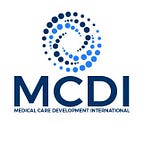Spreading the Word on Cervical Cancer Prevention
“Don’t be afraid, a test could save your life,” says one poster near a hospital room in Niefang, Equatorial Guinea. “Dear woman! Take the test and save your life,” reads a health worker’s shirt at another hospital on Bioko Island. These messages are promoting cervical cancer screenings for women across Equatorial Guinea, as a way to prevent one of the most prevalent causes of cancer deaths for women in the country. Finding cervical cancer early is essential for saving lives, as most cases can be cured or avoided if caught early. Unfortunately, in many areas around the world, access to preventative reproductive health care is scarce. MCDI is spreading the message to women in Equatorial Guinea that screenings, now offered in across the country, are essential to preventing a deadly form of cancer.
In May, in coordination with the Bioko Island Malaria Control Project (also led by MCDI), the Equatorial Guinea Cervical Cancer Screening and Treatment (EG-CCST) project, funded by the Government of Equatorial Guinea and Noble Energy, conducted a training for 39 local journalists on communication for cervical cancer screening and treatment, as well as malaria control and prevention. This training provided an overview on cervical cancer prevention, providing guidance on promoting women’s participation in screenings, both at health facilities and through MCDI’s mobile screening clinics across the country.
On the radio, advertisements promoting screenings run four times per day in Malabo and Asonga. On the news show “El Recorrido,” key messages on cervical cancer prevention are delivered three times per day, often phoning in the Project’s Communications Officer Victor Mba to discuss the Project’s activities. On television, the Project’s experts have appeared multiple times on the national Sunday morning news show “Nuestra Guinea” y “Balcón del Domingo.” These news spots spread essential information about the prevalence of cervical cancer in the region and the importance of attending screening rooms or mobile clinics.
Another important activity for “getting the message out” is achieved through the training of community advocates. The advocates, during door-to-door campaigns, conduct home visits throughout the regions served by the project to speak with women one-on-one about the importance of prevention through screening. The Minister of Social Affairs and Gender Equality has mobilized the support of government delegates to encourage women in their communities to attend mobile screening campaigns. In addition, between April and June of this year, over 2,300 women were visited at their homes by project staff to inform them about the services available to them. MCDI staff were also present at the Saturday public market in Malabo handing out informational packets.
These outreach activities have proven effective — since April 2017, over 8,400 women have been screened for cervical cancer in Equatorial Guinea. Seven consultation rooms are now open and operational across the country on both Bioko Island and the country’s mainland, and mobile screenings continue to reach populations that may have difficulty accessing the health facilities. These services are offered completely free of charge to women, and are a one-stop service, providing both screening and treatment services in one visit, reducing the financial or time burden on women seeking services.
Whether it is a sign, a pamphlet, the media, a t-shirt, or a conversation — spreading the word about prevention programs is essential for the reduction of cervical cancer. With access to test and treat services, women have the power to take control of their health. In Equatorial Guinea, MCDI is working to ensure the demand for and availability of life-saving screenings for all women, and that these services are sustainable nation-wide.
